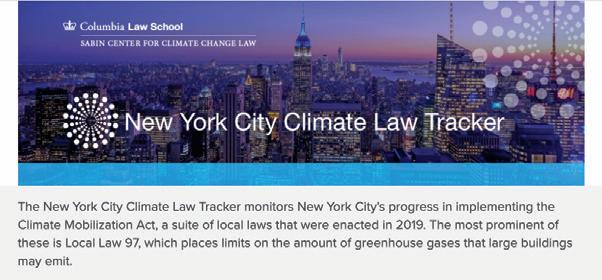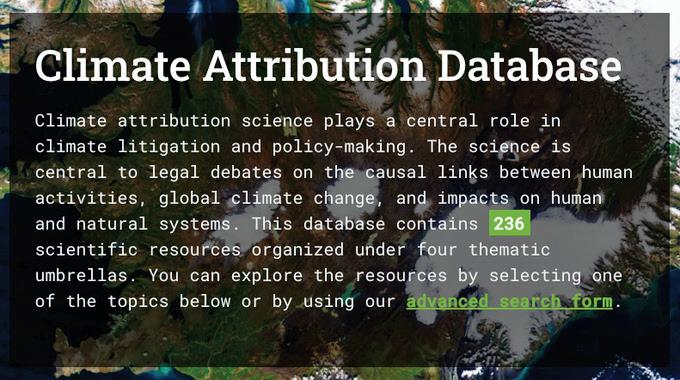
4 minute read
Media Mentions and Interviews
Highlights
Seven Ways the Election Will Shape the Future of Science, Health and the Environment, Scientific American In this article, Hillary Aidun comments on the environmental stakes at play in the November 2020 presidential election.
Advertisement
Video: Trump’s Widespread and Well-Coordinated War on Science, NowThis News In this video, Romany Webb talks about the efforts of the Trump administration to muzzle scientific information that we’ve collected in the Silencing Science Tracker.
Australia faces legal challenges over bonds’ climate risks, Financial Times Michael Burger weighs in on the climate risks disclosure lawsuit against the Australian government.
Charleston Aims to Force Fossil Fuel Companies to Pay $2bn to Combat Climate Crisis, The Guardian Ama Francis is quoted in this article commenting on the litigation involved with Charleston’s lawsuit.
Does Your State Want to Cut Carbon Emissions? These Old Laws Could Be Standing in the Way, Grist Amy Turner talks about old local laws that could hobble action on climate change in cities.
How Climate Change is Fueling RecordBreaking California Wildfires, Heat and Smog, LA Times Michael Gerrard is quoted in this article talking about climate change’s connection to this summer’s wildfires in CA.
As Climate Disasters Pile Up, a Radical Proposal Gains Traction, The New York Times In this article, Michael Gerrard talks about the legal prospects of carbon dioxide removal as a means of atmospheric CO2 reduction.
Rolling Back Trump’s Rollbacks: Biden Seen Reversing Climate Deregulation, Reuters Michael Burger comments on the Trump Administration’s deregulatory efforts claiming, “nothing Trump has sought to accomplish on climate change is secure.”
Biden Could Roll Back Trump Agenda With Blitz of Executive Actions, The New York Times Michael Gerrard speaks about the Sabin Center’s Reregulation Report and the ways a Biden admin could use it for climate action.
The Environment Is In Trouble. Here’s What Biden Can Do To Address It., National Geographic In this article, Michael Burger talks about what executive authority a President Biden could use to protect the environment..
Online Resources
New York City Climate Law Tracker In July, the Sabin Center launched the New York City Climate Law Tracker. It monitors New York City’s progress in implementing the Climate Mobilization Act, a suite of local laws that were enacted in 2019. The most prominent of these is Local Law 97, which places limits on the amount of greenhouse gases that large buildings may emit.

Climate Attribution Database In November, Michael Burger, Jessica Wentz, and Daniel Metzger, along with our colleague Radley Horton at LDEO launched the Climate Attribution Database. Climate attribution science plays a central role in climate litigation and policymaking. The science is central to legal debates on the causal links between human activities, global climate change, and impacts on human and natural systems.

New York State Climate Law Tracker In July, the Sabin Center also launched the New York State Climate Law Tracker to monitor New York’s progress in implementing its path-breaking Climate Leadership and Community Protection Act, Environmental Justice Law, Community Risk and Resiliency Act, and Accelerated Renewable Energy Growth and Community Benefit Act.
Carbon Dioxide Removal Law Database In October, the Sabin Center, in conjunction with the Center on Global Energy Policy, launched the Carbon Dioxide Removal Law Database, an annotated bibliography of legal materials related to carbon dioxide removal and carbon sequestration and use.

Additional Resources Our Climate Litigation databases, Climate Change Laws of the World database, Model Laws for Deep Decarbonization, Silencing Science Tracker, and Climate Deregulation Tracker may all be found at our Resources homepage.
Earth Institute The Sabin Center is a member center of the Earth Institute at Columbia University, and frequently collaborates with Earth Institute scientists on cutting edge interdisciplinary research.
Campus Sustainability and Climate Action
Michael Gerrard has continued his leadership role in the campus-wide Sustainability Initiative, as co-chair on the Senior Advisory Committee, which has launched the effort to come up with a new sustainability plan for the period 2021-2030. The Initiative is now engaged in a comprehensive greenhouse gas master planning effort that will reshape decision-making relating to emissions and energy use on campus.
The Sabin Center has also been involved in the many conversations happening around formation of the Climate School at Columbia University. As a member of the Earth Institute’s faculty, Michael Gerrard has been heavily involved in the planning for the Climate School. Michael Burger has participated in preliminary consultations and a number of strategic roundtable discussions. Ama Francis was a member of the planning committee that identified key components needed to launch a major project on Coastal Viability under the Columbia Climate School: Resilient Coastlines Now.


